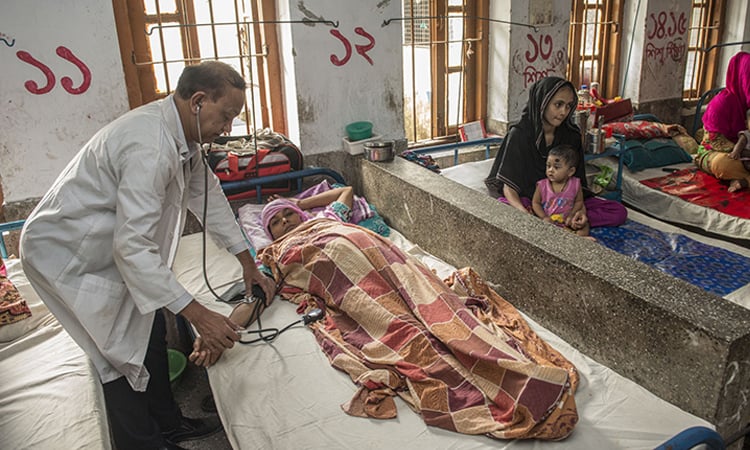
DHAKA, May 11, 2025 (BSS) – A recent public opinion survey has revealed that an overwhelming 97 percent of citizens of the country favor free primary healthcare services.
The findings also highlighted overwhelming public demand for more accessible and affordable healthcare across the country.
The Bangladesh Bureau of Statistics (BBS) conducted the survey at the request of the Health Sector Reform Commission to assess public demand for healthcare reforms.
The study gathered data from approximately 8,256 citizens across the country.
The Health Sector Reform Commission (HSRC), established by the current interim government, has put forth its recommendations in a report recently to Chief Adviser Professor Muhammad Yunus.
The 332-page report prominently features findings from the survey, emphasizing public demand for healthcare reforms.
The report stated that the questionnaire for the household-based survey was divided into four sections: identification and listing of household members, individuals' experiences in accessing healthcare, public opinions on healthcare accessibility, and policy-related questions.
To conduct the public opinion survey, approximately 344 primary sample areas— also known as census enumeration areas— were selected from both urban and rural regions across all eight divisions of the country.
For the purpose of the survey, 24 regular households were selected from each chosen sample area using a sampling method. Data were collected from one individual aged 18 or above in each selected area, using a structured questionnaire.
Data were collected from approximately 8,256 citizens across the country. Following this, all subsequent activities— including data analysis and report preparations— were carried out.
The survey used Integrated Multipurpose Sampling (IMPS), based on the Population and Housing Census 2022, as the framework for data collection.
The findings of the public opinion survey revealed that 97 percent of respondents believe primary healthcare should be provided free of cost. Additionally, 97 percent supported regulating the prices of medicines, while 96 percent favored fixing the costs of diagnostic tests and 95 percent for doctor's consultation or surgery fees.
Furthermore, 92 percent of citizens expressed support for establishing primary healthcare centers at ward level of the union in urban areas.
Meanwhile, 72 percent backed the idea that public health services— including medical treatment, health education, and disease prevention— should be managed through a separate and dedicated infrastructure.
The survey also found that 76 percent of respondents supported the transfer of personnel working in auxiliary positions. Additionally, 68 percent favored restricting the sale of antibiotics to prescriptions issued only by MBBS-qualified doctors.
An overwhelming 92 percent of citizens believed that the government should bear the majority of healthcare expenses.
In terms of broader health policy, 79 percent supported imposing higher taxes on unhealthy food, beverages, and consumer goods.
Meanwhile, 71 percent expressed interest in enrolling in health insurance schemes, and 67 percent agreed that similar services operated by the Directorate General of Health Services and the Directorate General of Family Planning should be merged.
The government formed the 12-member HSRC in November 2024 to guide systemic improvements in healthcare delivery. The commission is chaired by Professor Dr. AK Azad Khan, President of Diabetic Association of Bangladesh.
The commission also includes Professor Md Muhammad Zakir Hossain, Public Health and Health Informatics Department at BMU; Prof Dr Liaquat Ali, chairman of Pothikrit Foundation; Prof Dr Sayera Akther, a gynecologist; Prof Dr Naila Zaman Khan, a neurologist, the Department of Pediatric Neuroscience; MM Reza, former secretary; Prof Dr Muzaherul Huq, former regional adviser (South-East Asia Region) at the WHO; Dr Azharul Islam, ICDDR,B; Prof Dr Syed Md Akram Hossain, Square Cancer Centre, Square Hospital; Prof Dr Syed Atiqul Haque, chief consultant of Green Life Centre for Rheumatic Care and Research; Dr Ahmed Ahsanur Rahman, scientist at ICDDR,B; and Omair Afif, a student of Dhaka Medical College.